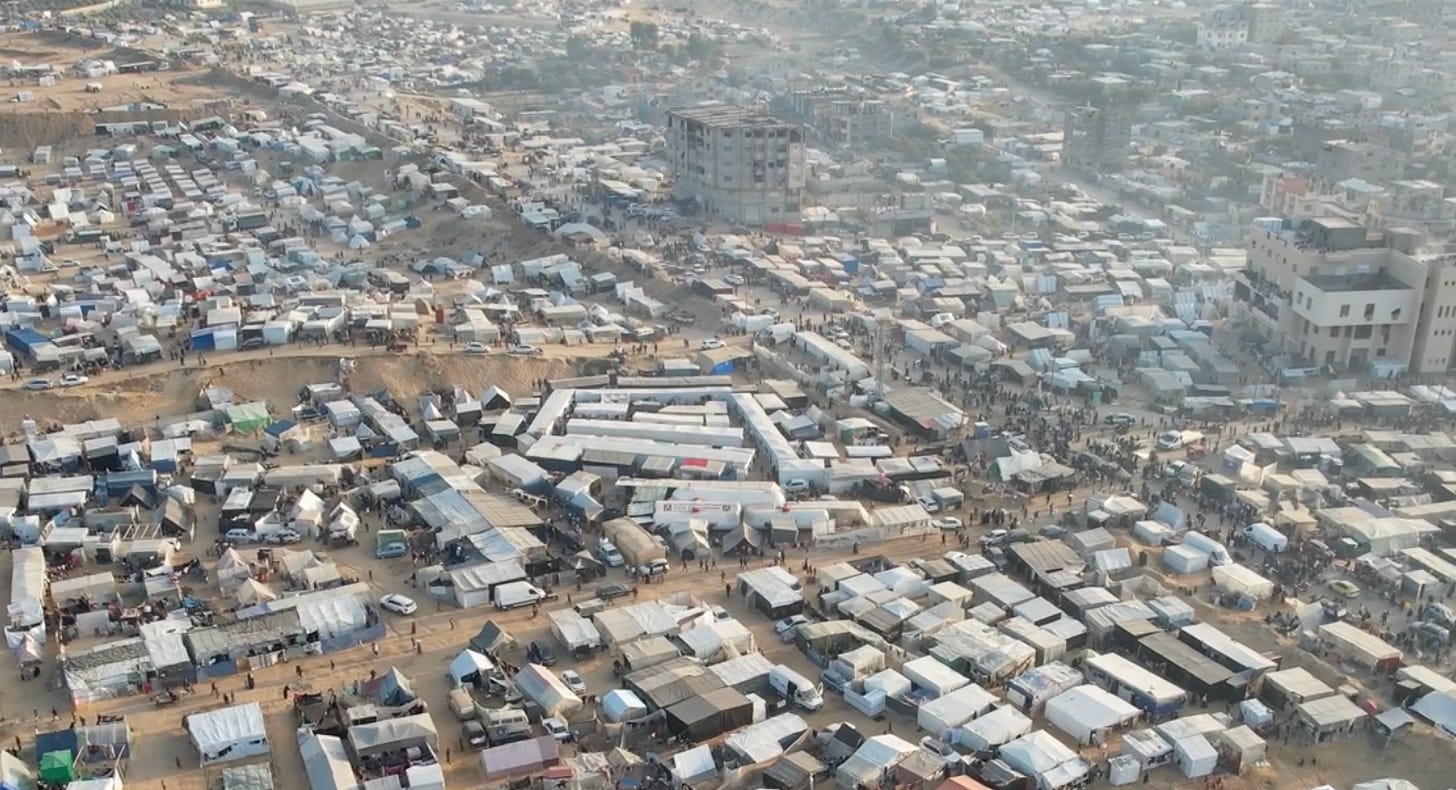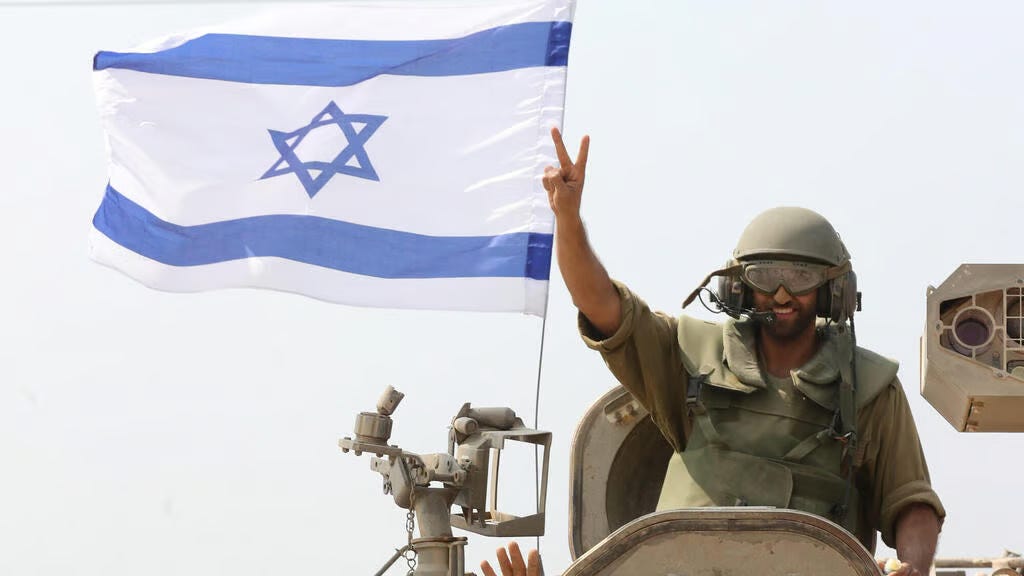
Though in radically different ways, both Hamas and the United States are using Gaza’s civilians as human shields. There is nothing new about this phenomenon. Hamas, which knows that dead civilians are the best means of increasing international pressure on Israel to accept a ceasefire, has always welcomed civilian deaths. The U.S., by contrast, has publicly lamented the killing of innocent Palestinians and repeatedly adduced them as the reason for its demand—in 2008-9, 2012, 2014, 2021—that Israel stop its counteroffensives against Hamas. For Hamas, Palestinian civilians as human shields are a get-away-with-terror free card. For America, they are a way of assuaging important constituencies both at home and abroad, and of avoiding wider conflicts into which its armed forces might be drawn. Either way, the civilians have consistently been used—cynically, politically, effectively—as breathing barricades against the IDF.
Contrary to much of world opinion, Israel doesn’t break through those barriers but goes rather to unprecedented lengths to fight around Palestinian civilians or relocate them peacefully. Accidents do happen—not only Palestinians but also Israeli soldiers are frequently the victims of friendly fire—and the densely populated and built-up landscape of Gaza, together with the labyrinth of tunnels beneath it, makes distinguishing between civilians and non-uniformed terrorists particularly daunting. Still, the IDF has achieved the lowest civilian-to-combatant fatality ratio of any modern army. And the deaths of any civilians, whether or not they were used as human shields by Hamas, are tragedies.
Still, never before have those human shields been more massively wielded than in Rafah. There, an estimated 1.2 million Palestinians, most of them refugees from the northern, war-torn, areas of Gaza, are crowded in makeshift tents up against the impermeable Egyptian border. Beneath them, cowering in the tunnels, are Hamas’s remaining two battalions and their demonic leader, Yahya Sinwar. With them, are 133 Israeli hostages, many of them already dead, who serve as his bargaining chips.
Sinwar knows the excruciating price that Israel is willing to pay for freedom for a mere quarter of the hostages. Israel, he knows, will agree to release many hundreds of Palestinian terrorist prisoners, numbers of with Israeli blood on their hands. Israel will allow Gazan refugees to return, uninspected, to Northern Gaza where some will undoubtedly reestablish Hamas cells. Most submissively, Israel will agree to a forty-day truce. But one thing Israel won’t yield is what Sinwar wants most: a permanent ceasefire that enables him to emerge from the rubble, declare victory, and begin the reconquest and re-militarization of Gaza.
Israel, quite rightly, refuses to declare defeat in the war, to deny the tens of thousands of its citizens the ability to return to a normal life along its southern border, and to restore the deterrence the state desperately needs to confront Iranian missile onslaughts and daily Hezbollah rocket fire. Minus a deal with Hamas, Israel is unwilling to concede its last opportunity to secure the release of the hostages through pressuring the terrorists militarily in Rafah.
As the two previous hostage deals proved, only when faced with certain military defeat will Hamas give up its captive Israeli “assets.” But Hamas may not face such a prospect in Rafah, thanks to its 1.2 million human shields. Thanks not only to the terrorists’ use of them, but also America’s.
During his visit to Israel this week, Secretary of State Antony Blinken, described Israel’s latest hostage release offer to Hamas as “extraordinarily generous.” Yet, in his closed-door conversations with Israeli officials, the secretary reportedly “reiterated the United States’ clear position on Rafah.” Publicly, that position held that the White House would oppose any incursion into Rafah unless Israel produced a persuasive plan to evacuate Palestinians civilians from the combat areas. But privately, according to columnist Thomas Friedman who dependably reflects the administration’s views, the policy is far more unequivocal. “No massive invasion of Rafah, period.” Friedman went further by conveying Washington’s threat to cut back or even curtail military supplies to Israel should it proceed with the Rafah operation. The United States will not sit passively by, he indicated, while many more Palestinian civilians were killed.
Israel, in reply, did not retreat from its offer but neither would it back down from its determination to continue its campaign to vanquish Hamas with or without a temporary ceasefire. With the centrists threatening to quit the national unity coalition if it rescinded its offer, and the radical rightists threatening to topple the government entirely if it didn’t, the decision has basically been left to Sinwar. Would he accept the deal as he did under significantly less advantageous terms in November or continue, as he’s done ever since, to reject it?
As of this writing, the answer is clear. Sinwar has rebuffed Israel’s offer. And why shouldn’t he? While placing the blame for the stalled negotiations squarely on Hamas and extolling Israel’s generosity, by opposing a Rafah incursion under any circumstances, the United States is removing Sinwar’s incentive to compromise. He can say “no” and confidently pay no price. Secure behind the human shields used by both Hamas and the United States—the first physically and the second diplomatically—Sinwar has no reason to yield concrete “assets” for anything less than a permanent ceasefire.
This leaves Israel with grim choices. Israel can enter Rafah, risk causing further Palestinian civilian casualties, and suffer a rift with Washington. Or, Israel can consent to endless hostage negotiations and pressure to reduce our already watered-down terms. Israel can restore our internal and regional security and secure the release of at least some of the hostages or forfeit the very attractive carrots—peace with Saudi Arabia, an inter-Arab force to oversee Gaza’s reconstruction, and a regional defense pact against Iran—Washington is purportedly dangling before us in return for not invading Rafah.
Many factors brought us to this point, among them the U.S. presidential elections and genuine concern for Palestinian lives, the Israeli government’s refusal to discuss “day after” scenarios or to mount even a minimal public diplomacy defense against charges of war crimes and genocide. But the greatest single determinant was, once again, the human shields. Why have they been so instrumental in deciding the course and perhaps even the outcome of this war? What makes them different from any other civilian population—in Iraq, for example, Syria, and Afghanistan—used by terrorists as protection against regular armies?
The answer couldn’t be simpler: It's because the terrorists’ enemies are Jews. By holding Israel not only to a double-standard but, as so often throughout our history, to an utterly unique one, the world endows the Palestinians with a singular status as well. They are not merely one of many nameless victims, but victims par excellence. Whether through its Jew-hatred or Jew obsession, the world grants the Palestinians singular immunity. But so, too, does Israel.
Faced with the massacre and mutilation of 1,200 of its citizens—the equivalent of 40,000 Americans—and the barbarous capture of 252 more—virtually any other country would have leveled Gaza immediately. Many tens of thousands would have been instantly killed. Though some Israelis supported such retaliation, their numbers remained relatively small and were swiftly sidelined by overwhelming backing for a large-scale, district-by-district operation that aimed, sometimes at the cost of our own soldiers’ safety, to limit Palestinian casualties while downgrading Hamas and pressuring it to relinquish our hostages. If Israel truly sought to commit genocide, it certainly had the wherewithal to do it. Yet even if the IDF had ordered all its thousands of tanks, guns, and fighter jets to fire at will at Gaza, few, if any, of its soldiers would have obeyed. The vast majority, even on October 7th, would have refused.

The reason is not mainly or even principally fear of international repercussions. The reason relates to who and what we are as a nation, a people, and a state. The human shields that Palestinian terrorists hide behind and which the United States, however inadvertently, helps them hoist, are rendered far more impenetrable by the presence of an even more formidable shield—the Shield of David.




I can't even begin to describe the hatred I feel for Thomas Friedman as he sits sipping his latte in New York City and demands Israel lose the war so he can hold onto his delusion that there will be heaven on earth if only a couple more "deals" can be signed. I think I hate him more than I hate Biden Blinken and Schumer who at least have the excuse of caring about winning elections. Friedman has no such excuse.
Wisdom is a scarse commodity. The lack of it in the "West" is dangerous to our civilization. It is a result of deficient moral grounding and the courage to defend it. Civilization truly depends on a fidelity to our Judeo-Christian principles and today we are once again put to the test. Hopefully we will not be found wanting. Supporting Israel is a positive step in defending our culture.